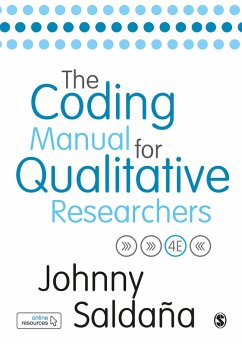
The A-Z of Social Research (eBook, PDF)
A Dictionary of Key Social Science Research Concepts
Redaktion: Miller, Robert Lee; Brewer, John D.
Versandkostenfrei!
Sofort per Download lieferbar
48,95 €
inkl. MwSt.
Weitere Ausgaben:

PAYBACK Punkte
24 °P sammeln!
`A detailed and valuable addition to the literature that will be a very useful resource for lecturers, as well as having a wide appeal among students' - Tim May, University of SalfordHave you ever wondered what a concise, comprehensive book providing critical guidance to the whole expanse of social science research methods and issues might look like? The A-Z is a collection of 94 entries ranging from qualitative research techniques to statistical testing and the practicalities of using the Internet as a research tool. Alphabetically arranged in accessible, reader-friendly formats, the shortest...
`A detailed and valuable addition to the literature that will be a very useful resource for lecturers, as well as having a wide appeal among students' - Tim May, University of Salford
Have you ever wondered what a concise, comprehensive book providing critical guidance to the whole expanse of social science research methods and issues might look like? The A-Z is a collection of 94 entries ranging from qualitative research techniques to statistical testing and the practicalities of using the Internet as a research tool. Alphabetically arranged in accessible, reader-friendly formats, the shortest entries are 800 words long and the longest are 3000. Most entries are approximately 1500 words in length and are supported by suggestions for further reading. The book:
- Answers the demand for a practical, fast and concise introduction to the key concepts and methods in social research
- Supplies students with impeccable information that can be used in essays, exams and research projects
- Demystifies a field that students often find daunting
This is a refreshing book on social research methods, which understands the pressures that modern students face in their work-load and seeks to supply an authoritative study guide to the field. It should fulfil a long-standing need in undergraduate research methods courses for an unpatronising, utterly reliable aid to making sense of research methods.
Have you ever wondered what a concise, comprehensive book providing critical guidance to the whole expanse of social science research methods and issues might look like? The A-Z is a collection of 94 entries ranging from qualitative research techniques to statistical testing and the practicalities of using the Internet as a research tool. Alphabetically arranged in accessible, reader-friendly formats, the shortest entries are 800 words long and the longest are 3000. Most entries are approximately 1500 words in length and are supported by suggestions for further reading. The book:
- Answers the demand for a practical, fast and concise introduction to the key concepts and methods in social research
- Supplies students with impeccable information that can be used in essays, exams and research projects
- Demystifies a field that students often find daunting
This is a refreshing book on social research methods, which understands the pressures that modern students face in their work-load and seeks to supply an authoritative study guide to the field. It should fulfil a long-standing need in undergraduate research methods courses for an unpatronising, utterly reliable aid to making sense of research methods.
Dieser Download kann aus rechtlichen Gründen nur mit Rechnungsadresse in A, D ausgeliefert werden.













